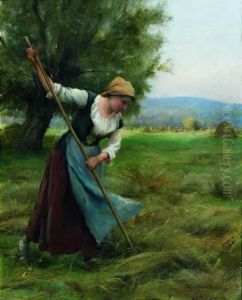Therese Cotard-Dupre Paintings
Therese Cotard-Dupré was a French artist born in 1849, primarily known for her work as a painter. Despite the challenges faced by women in the arts during the 19th century, Cotard-Dupré managed to carve out a space for herself in the French art world, which was heavily dominated by her male counterparts.
Cotard-Dupré's early life and education remain relatively obscure, as the historical record focuses more on her male contemporaries. What is known is that she developed her skills in an era when women were often barred from formal artistic institutions such as the École des Beaux-Arts until 1897. Women artists like Cotard-Dupré often had to find alternative means of education, such as private tutoring or smaller, independent academies that were more accepting of female students. She likely benefited from the changing attitudes towards women artists at the end of the 19th century, which were partly influenced by the women's rights movement and the gradual acceptance of female artists in salons and exhibitions.
Throughout her career, Cotard-Dupré exhibited her works in various salons and galleries. Her style was influenced by the dominant artistic movements of her time, including Realism and Impressionism. These movements emphasized the portrayal of everyday life and the play of light and color, respectively. Although specifics about her artistic achievements are scant, it is clear that she was dedicated to her craft and contributed to the rich tapestry of French art history.
Therese Cotard-Dupré's death occurred in 1925. By the time of her passing, the art world had seen the emergence of many more women artists, some of whom would go on to achieve considerable fame. Cotard-Dupré's legacy, like that of many women artists of her time, has been somewhat overshadowed by her male contemporaries. However, recent efforts in art historical scholarship have aimed to re-evaluate and recognize the contributions of women in the arts, leading to a renewed interest in artists such as Cotard-Dupré.
